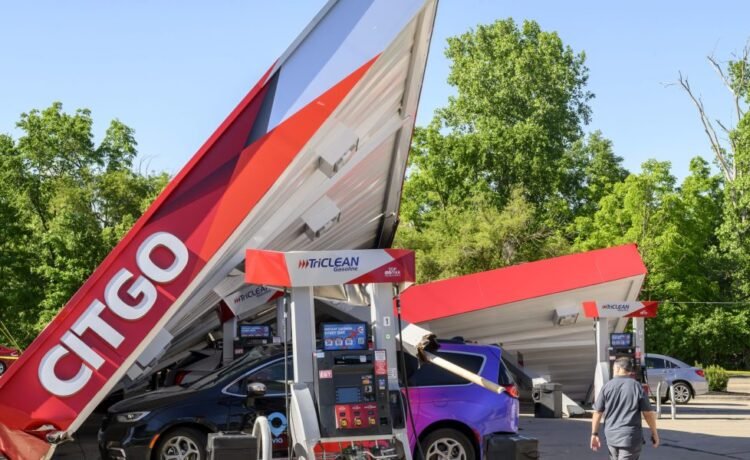Michigan tornado and Ohio and Maryland storms kill toddler and injure at least 13


A tornado that ripped through suburban Detroit earlier this week downed trees that smashed through the roof of Abby Sata’s family home, sending water gushing below.
Though they now have a giant crane taking trees off the house, they were lucky no one was hurt. The tornado that damaged Sata’s home in Livonia, Michigan, tore through several neighborhoods and felled a tree that killed a toddler on Wednesday. It developed so quickly that there was no advance notice from the National Weather Service or others that would have normally led to the activation of warning sirens.
Sata, 21, said she got a storm warning on her phone but no indication that a tornado was lurking.
“I was in shock,” she said. “It would have been very helpful. Even three seconds before the tornado would have given me a heads-up.”
The twister in Livonia “spun up almost as quickly as it started to dissipate,” said Jaclyn Anderson, a meteorologist with the Detroit office of the National Weather Service. The tornado, which was of a type known for being weak and brief, traveled a path of about 5 miles (8 kilometers). More powerful tornadoes generated from intense storms can stay on the ground for 30, 40 or even 100 miles and are much easier to anticipate and issue warnings for, she said.
While tornado-forecasting equipment has improved “tenfold” over the past few decades, relying on a combination of weather radar and local observations, Anderson said short-lived tornadoes can still be “quite challenging when it comes to getting warnings out.”
Forecasters create tornado outlooks every day, factoring in different weather elements, said Victor Gensini, an associate professor at Northern Illinois University who studies tornadoes and extreme weather. But sometimes those conditions happen on a small scale — for instance, a sudden breeze coming off a lake.
It has been a grim spring for tornadoes in the U.S. April had the second-highest number of tornadoes for that month on record in the country.
In suburban Maryland, a line of storms produced unusually strong tornadoes that felled trees, damaged buildings and downed power lines Wednesday night.
But while Gensini did say that the national numbers are a little above average at the moment, it’s too early to make definitive statements about the tornado year as a whole. He said the U.S. can get as many as 1,500 tornadoes a year, and this time of year is statistically the most likely for tornado activity in the U.S.; many of them just aren’t in high-profile places or aren’t captured in clear images.
“The tornadoes that have occurred this year have been very visible,” he said.
Gensini, who also studies how climate change is affecting tornado activity, said that the science of attributing twister-spawning storms to climate change is still in its infancy, and it can be hard to connect the dots to one individual tornado. But looking at broader-scale trends, his team has found an increasing likelihood of tornadoes developing in regions farther south and east in the U.S. than in the past.
Tornado warnings were issued for parts of several other states on Wednesday night, including Ohio, New Jersey and Delaware. In Ohio, a suspected tornado ripped away a gas station canopy and heavily damaged a restaurant and a discount store early Thursday in the eastern village of Frazeysburg. Eight people suffered minor injuries, mostly from flying debris, said Jeff Jadwin, the emergency management director in Muskingum County.
While tornadoes are not unheard of in Maryland, they are relatively rare — especially outbreaks of the volume seen Wednesday night. At least five people were injured and the weather service issued 22 tornado warnings Wednesday, the fourth-most issued in a single day by the office that covers much of Maryland, the District of Columbia, northern Virginia and the eastern West Virginia panhandle, according to Kevin Rodriguez, lead meteorologist at the weather service office in Sterling, Virginia.
“It was a very busy night,” said National Weather Service Hydrologist Jeremy Geiger. “It’s one of those things, all the right ingredients that come together at the right time. So that’s always the question.”
Geiger said it wasn’t a super high-energy storm system, but the wind shear and other factors gave it a boost and created the rotation that allows tornadoes to form. He said the system was especially challenging because forecasters were issuing flash flood warnings and tornado warnings simultaneously, with some residents being advised to seek high ground and others sheltering in the basement.
In Gaithersburg, Maryland, George Mhaano told WJLA-TV that a crane might be needed to lift a tree off his home, so he would probably stay at a hotel. When the tornado hit, Mhanno said he heard loud thuds and banging on the window, so he hid in a bathtub. Later, firefighters came knocking and told him to get out, which he did.
“Thank God, I wasn’t hurt. And thank God, everyone at my house was at church,” Mhaano told WJLA-TV. “This is just material. It can be replaced or fixed. No one got hurt, so that’s all that matters.”








